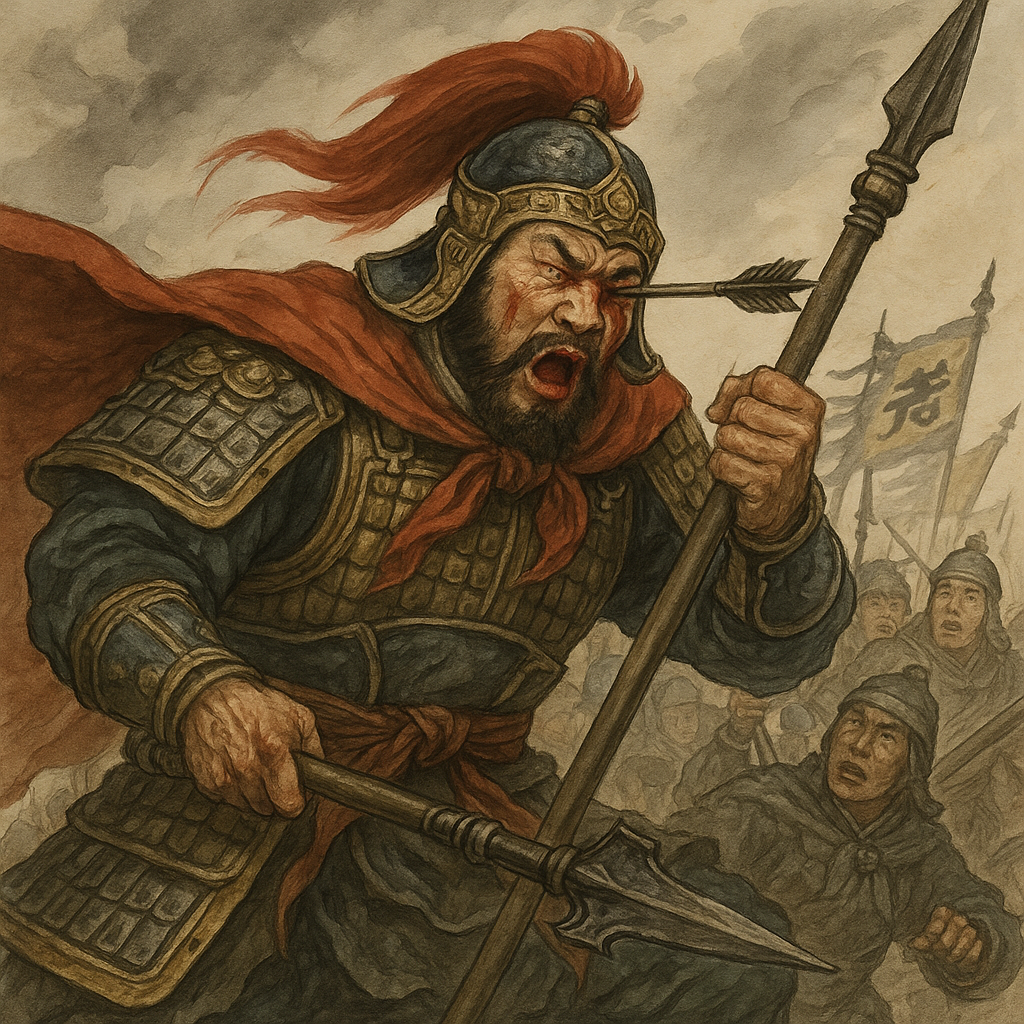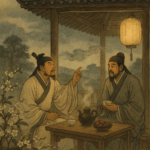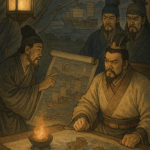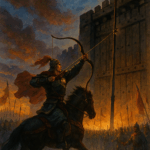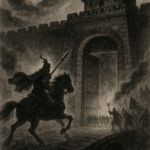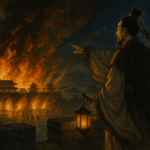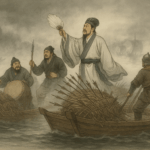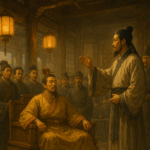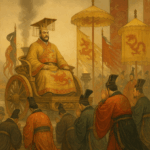Jia Xu discerned Cao Cao’s designs and resolved to turn them against him. He told Zhang Xiu, “I have watched Cao Cao circle this city for three days. He eyes the southeast corner, where the brickwork and earth show new and old patches, and the wall’s deer-horn reinforcements are broken. He will scale the walls there under cover of darkness. Meanwhile he feints at the northwest, piling brush to draw our forces away. Tomorrow, place your best troops lightly armed and well fed inside the houses at the southeast wall, while having the villagers masquerade as soldiers at the northwest corner. Let him climb freely at southeast—then at the signal of a single cannon shot, ambush him and you will capture him.” Zhang Xiu grinned. “Brilliant! We shall do as you say.”
A scout brought word that Zhang Xiu had withdrawn his garrison to the northwest corner, leaving the southeast almost empty. “My plan has succeeded!” Cao Cao exclaimed. He secretly prepared scaling ladders and hooks, and by day bombarded the northwest corner. At the second watch, he led an elite force to the southeast, scaled the wall, and cut down the broken deer-horn posts. With no alarm from within, his troops poured into the city. At the cannon’s boom, hidden detachments sprang up and Cao Cao’s players scattered. Zhang Xiu himself charged with his bravest, and Cao Cao’s army broke in rout, fleeing dozens of li. Zhang Xiu pursued them through the night until dawn, tallying over fifty thousand enemy casualties and severing countless supply wagons. Lü Qian and Yu Jin were wounded in the fight.
Jia Xu, seeing Cao Cao’s defeat, urged Zhang Xiu to send a letter to Liu Biao demanding he cut off the retreat. Liu Biao received the plea and prepared to march. A scout, however, reported that Sun Ce was camping at Hukou. Kuai Liang warned, “Sun Ce’s river-mouth camp is a trap by Cao Cao—if we do not strike first, we will regret it.” Liu Biao placed Huang Zu to guard the pass and led his host to Anzhong County to intercept Cao Cao’s rear, arranging to rendezvous with Zhang Xiu. Upon learning this, Zhang Xiu and Jia Xu jointly mustered their forces to attack.
Meanwhile, Cao Cao’s columns advanced slowly toward Xiangcheng and the Clear Water River. Suddenly he wept aloud from his horse. His officers cried, “Why do you mourn, my lord?” Cao Cao answered, “Here last year I lost my great champion Dian Wei—it cannot help but bring me to tears!” He ordered the army to halt and held elaborate rites for Dian Wei’s spirit. He carried ashes of incense in his own hands, weeping at the altar; the entire host stood mute with grief. After honoring Dian Wei, he also offered sacrifices for his nephew Cao Anmin and his eldest son Cao Ang, and even for the famous steed that had died saving his master.
That night, Xun Yu’s messenger arrived: “Liu Biao has allied with Zhang Xiu, blocking our route at Anzhong.” Cao Cao calmly wrote back, “Though I march slowly, I know full well they pursue me. My plan is set—at Anzhong I will crush Zhang Xiu. Do not doubt.” He spurred his army to Anzhong’s border. Liu Biao’s host held the high ground; Zhang Xiu’s men followed in close support. Cao Cao ordered his troops to clear the narrow pass by night, hiding an elite force. At dawn, Liu Biao and Zhang Xiu advanced, thinking him trapped—and were ambushed and routed. Exiting the pass, Cao Cao’s men blocked the exit. Liu Biao and Zhang Xiu met with their shattered remnants. “We fell into Cao Cao’s trap,” Liu Biao admitted. Zhang Xiu urged, “Let us plan again.” They encamped together at Anzhong.
Word soon arrived that Yuan Shao intended to march on Xuchang. Xun Yu rode through the night to warn Cao Cao, who instantly turned north. Zhang Xiu prepared to pursue, but Jia Xu counselled, “Do not chase—pursuit invites defeat.” Liu Biao fretted, “If we do not follow, we lose our chance!” He prevailed, and Zhang Xiu led ten thousand men in pursuit. They overtook Cao Cao only to suffer a heavy reverse. Zhang Xiu lamented, “If we had followed Jia Xu’s counsel, we’d have triumphed.” Jia Xu urged them to march again and pledged, “If we fail, you may execute me.” Zhang Xiu agreed; Liu Biao demurred. So Zhang Xiu alone led his column in pursuit—and indeed trapped Cao Cao’s rear guard, scattering wagons and soldiers. As Zhang Xiu pressed on, a fresh banner appeared from the hills. Alarmed, Zhang Xiu halted and withdrew to Anzhong.
Liu Biao asked Jia Xu, “When I chased the enemy I lost—when I sat and watched I won. How is this?” Jia Xu replied, “Because Cao Cao left a strong rear guard to cover a retreat, you attacked prematurely and were beaten. Once he was securely underway, he turned to his hidden force and crushed your exhausted troops.” Convinced, they parted—Liu Biao back to Jingzhou, Zhang Xiu to guard Xiangcheng.
Back on the march, Cao Cao heard his rear guard pursued him and wheeled his columns to rescue them—only to find Zhang Xiu’s attack repulsed. A soldier reported, “If not for the troops blocking the pass behind us, we would all have been captured.” Cao Cao demanded, “Who are these men?” A rider dismounted, saluted, and announced himself as Li Tong of Pingchun Commandery, an officer of Jiangxia. “I heard that Cao Cao fought Zhang Xiu and Liu Biao,” he said, “and came to your aid.” Cao Cao enfeoffed him Marquis of Achievement and put him in charge of the western frontier of Runan.
Returning to Xuchang, Cao Cao wrote to thank Sun Ce: “Because of your merit, you are appointed General Who Quells Rebellion with the title Marquis of Wu.” He then ordered Sun Ce to defend against Liu Biao as he pressed north.
Once home, Xun Yu asked, “My lord, how did you know victory awaited you at Anzhong?” Cao Cao answered, “When an enemy’s path is blocked, he must fight to the last. By delaying him in the pass and striking at dawn, I knew he could not resist.” Xun Yu bowed in admiration.
Just then Guo Jia arrived. “Why are you late?” Cao Cao asked. Guo Jia produced a memorial: “Yuan Shao plans to attack Gongsun Zan in the north. He seeks grain and troops.” Cao Cao smiled, “He plots against me—yet I do not fear him.” He read the boastful letter and mused, “How shall I deal with such arrogance?” Guo Jia advised:
“From Liu and Xiang to the founder of Han, wisdom wins where strength alone cannot. Yuan Shao fights by ceremony and contract; you act swiftly and decisively. He is lax, you are exact. He employs kinsmen, you choose by merit. He plans much but decides little; you decide and act. He seeks fame, you practice sincerity. He favors the near and neglects the distant; you embrace all. He stirs discord, you govern by virtue. He values show, not substance; you master the art of war. In every one of these ten measures, you surpass him—his defeat is assured.”
Cao Cao laughed, “So it shall be!” Xun Yu added, “Yuan Shao’s campaign against Gongsun Zan misdirects him. Seize the moment to strike Lü Bu in Xuzhou first, then turn to Yuan Shao.” Cao Cao nodded, sending envoys to Liu Bei to coordinate; meanwhile he secretly bestowed honors on Yuan Shao to lull him. Yuan Shao, flattered, moved against Gongsun Zan.
A New Danger in Xuzhou
At Xuzhou, Lü Bu entertained Chén Guī’s father and son, who flattered him shamelessly. Chén Gōng, displeased, warned Lü Bu in private, “Their praise masks ambition. You must be wary.” Infuriated, Lü Bu retorted, “You slander loyal men!” Chén Gōng grieved, “When one spurns honest counsel, disaster lies ahead.” He resolved to depart—but feared ridicule. His mood grew dark.
One day, he went hunting outside Xiaopei with a few riders and saw a swift messenger. Sensing intrigue, Chén Gōng abandoned the hunt, pursued the rider by a side path, and seized him. The messenger bore Liu Bei’s secret letter to Cao Cao. Chén Gōng carried both man and letter to Lü Bu. Lü Bu opened the missive:
“Cao Cao plans to subdue you, scion of the Tiger Lord. I lack forces and dare not move. Yet he raises a great host, so I ask you to be my vanguard. I will rally my scant troops behind your banner. I urge you to mobilize in force.”
Lü Bu cried, “That traitor dares?” and beheaded the messenger. Then he summoned Chén Gōng, Zàng Bà, and the bandit leaders Sun Guan, Wu Dun, Yin Li, and Chang Xi, assigning them to invade Shandong—Langya, Yidu, Jieshi, Xiapi, Guangling. He dispatched Gāo Shùn and Zhāng Liáo to Xiaopei against Liu Bei, and Sòng Xiàn and Wèi Xù to cross the Huai against Zhang Xiu.
At Xiaopei, invoiced by Gāo Shùn’s approach, Liu Bei consulted his lieutenants. Sūn Qián warned, “We should send word to Xuchang for aid.” Liu Bei asked, “Who will ride there?” Out stepped Jiǎn Yōng—a countryman from Liu Bei’s native commandery, now his guest officer. Liu Bei entrusted him with a letter and the night ride to Xuchang, then prepared his defenses: he himself manned the south gate, Sūn Qián the north, Guan Yu the west, Zhang Fei the east; Mi Zhu and his brother guarded the central camp (including Liu Bei’s wife, who was Mi Zhu’s sister).
Gāo Shùn’s force arrived and encamped outside Xiaopei. Liu Bei stood on the ramparts. “Why do you besiege me?” he shouted. Gāo Shùn sneered, “You conspire with Cao Cao—now you will be taken!” He ordered the assault. The next day Zhāng Liáo attacked the west gate. Guan Yu rode out to parley: “General, your valor is known—why besiege your brothers?” Zhāng Liáo fell silent, withdrew, and did not press the attack. Liu Bei refused to sally forth.
Overnight, Jiǎn Yōng reached Xuchang, handed his letter to Cao Cao, and reported the siege. Cao Cao summoned his advisers. “We must attack Lü Bu first,” Xun Yu said, “for Yuan Shao looms in the north.” Guo Jia urged immediate action: “Strike while Lü Bu is weakest.” Cao Cao dispatched Xiahou Dun, Xiahou Yuan, Lü Qian, and Li Dian with fifty thousand troops, with Jiǎn Yōng in attendance.
When Gāo Shùn heard of Cao Cao’s advance, he sent word to Lü Bu. Lü Bu detached Hóu Chéng, Hào Méng, and Cáo Xìng with two hundred riders to intercept Cao Cao, while his main host followed.
Liu Bei, seeing Gāo Shùn withdraw, knew Cao Cao was near. Leaving Sūn Qián to guard the city and Mi Zhu his sister, he rode out with Guan Yu and Zhang Fei to meet Cao Cao.
At dawn on the march, Xiahou Dun’s vanguard met Gāo Shùn’s cavalry. They clashed fiercely for over fifty exchanges until Gāo Shùn retreated. Xiahou Dun pursued around their right flank. In that moment Cao Xìng loosed a single arrow, striking Xiahou Dun’s left eye and driving it from its socket. Xiahou Dun cried out, “My father’s marrow and mother’s blood—how can I abandon them?!” With a warrior’s resolve, he plucked the eyeball from its socket, placed it in his mouth, and swallowed it. Then he spurred forward and slew Cáo Xìng with his spear. The enemy broke in panic. Xiahou Dun remounted and rejoined the battle. Gāo Shùn counterattacked, scattering Cao Cao’s troops. Only Xiahou Yuan and Li Dian fought their way back toward the main host. Seeing their peril, Cao Cao rallied the remnants at the ford of the Ji River.
As the sun rose, Gāo Shùn led a triumphant retreat. Suddenly Lü Bu’s column emerged on the heights, dividing into three wings under Zhāng Liáo, Gāo Shùn, and Lü Bu in person to attack Liu Bei’s three camps:
“Though the eye-eating champion fights on,
A centurion once struck cannot endure.”
It remains to be seen whether Liu Bei can hold his ground—more to follow.
